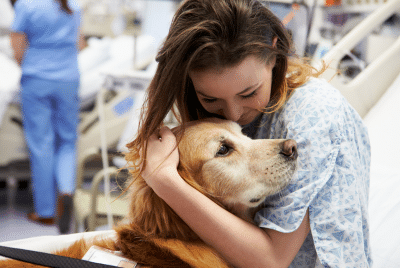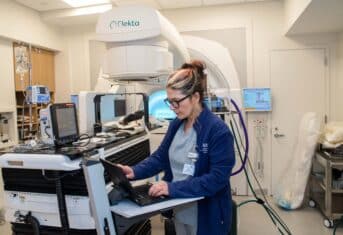Caring Canines: How Pets are Helping Cancer Patients

Caring Canines: How Pets are Helping Cancer Patients
November is National Pet Cancer Awareness Month and, for the rest of the month, my blogposts will focus on cancer and cancer treatment in pets. Last week, I provided a cancer care roadmap for pet owners following the diagnosis of cancer in their favorite fur person. Today, I am taking a bit of a different approach to cancer and pets. I am looking at some recent studies of how important pets are to people with cancer.
Sniffer Dogs Detect Cancer Early
Many of us remember the dogs used to diagnose COVID-19 at the height of the pandemic. Well, health professionals are exploring the ability of dogs to sniff out cancer. Studies are underway to train dogs to sniff out the most common human cancers, including those of the lung, breast and prostate. All this research needs confirmation, but early results are promising. These specially trained sniffer dogs have also helped their own kind when they demonstrated the ability to identify cancer in other dogs!
Cancer, Kids and Dogs
There are few things more heart-wrenching than a child with cancer. However, therapy dogs are doing their best to bring some light to these patients and their families. In a recent study, therapy dogs visited a children’s cancer clinic to measure their impact on the children’s health and psychosocial outcomes. Perhaps it is no surprise that a visit from a therapy dog reduced anxiety in the children’s families. Furthermore, children interacting with a therapy dog had no more bacteria on their hands when hand sanitizers were used after the interaction, so the dogs’ visit posed no additional health risk to the children.
Having a Pet After a Cancer Diagnosis
Pets provide us with companionship, decrease our anxiety and add purpose to our lives. This sentiment is shared by pet owners everywhere, including those diagnosed with breast cancer, as confirmed by a recent study. At the time of the breast cancer diagnosis, about 50% of patients had a pet, and I was surprised to read the variety of pets – dogs, cats, birds, fish and other unspecified pets. During the five years following the breast cancer diagnosis, more women added a pet to their family than stopped owning a pet. Let’s hope those who stopped owning a pet were not advised to do so by their physician, since the Centers for Disease Control don’t recommend cancer patients part with their pets. They recognize the importance of our finned, furred and feathered companions.
Before you scoff at the value of pet birds to those who are sick, I found a report from Sweden using pet birds as a nursing intervention to improve mental attention and social interaction in hospitalized patients!
More on Therapy Dogs for Cancer Patients
I was lucky to have therapy dog expert, Jane Kopelman of Memorial Sloan Kettering Cancer Center’s Caring Canines Therapy Dog Program, as a guest on a recent episode of the Ask the Vet Podcast. You can listen to our full discussion on AMC’s website or the podcast platform of your choice.

































